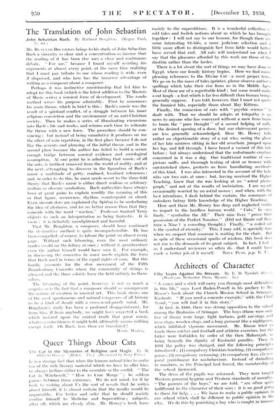The Translation of John Sebastian
Ma. It t-TiAxo Bovc IITON brings to his study of John Sebastian Bevil a sincerity so clear and a concentration so intense that the reading of it has been (for me) a close and continuous debate. '• For me," because I found myself resisting his
arguments at at 1 every point. at the saute t realizing that I 1 pay tribute to one whose reading is wide, even if dispersed, and who here has the immense advantage of writing as a composer about a composer.
Perhaps it was instinctive musicianship that led him to adopt for this book (which is the latest addition to the Masters of Music series) a sieal form of development. The rondo method serves his purpose admirably. First he announces his main theme. which in brief is this : Bach's music was the result of a spiritual conflict, of a struggle between his inner religi i tus conviction and the environment of an anti-Christian society. Then he makes a series of illuminating excites' into Bach's life and works, and returns each t bite to reiterate the theme with a new force. The procedure should be con-
vincing but instead of being • hat ive it produces on me the effect of vain repetition, in the first place bemuse I do not like the accents and phrasing of the initial theme, and in the second place because the author has failed to build a secure enough' bridge between musical evidence and sociological assumption. At one point he is admitting that music, of all the arts, is furthest removed front the world of reality, and at the next, attempting to discover in the figuration of Bach's musk. a multitude of petty, confined, localized references ; and. in order to cht this, he st needs resort to the three-fold I litany that Bach's music is either direct realism or arbitrary nealistit or obscure symbolism. Bach authorities [Mee always been at great pains to explain wordily the na•aning of this or that figure, recurrence, rhythm, counterpoint or chord. Even staccato dots are explained (by Spitta) to be underlining the idea of alert 'less, and for no better reason Hain that they coincide with the word " waehen." Professor Sanford Terry objects to such an interpretation as being fantastic. It is more ; it is definitely unenlightened and harmful.
That Mr. Boughton, a composer, should have continued the destructive method is quite incomprehensible. He has been mini wiled. of course, to labour the point on almost every page. Without such labouring, even the most ordinary reader woalcIsee the fallacy at once ; without il. peradventure even lite author himself would have seen it. For example, in discussing the concertos he must needs explain the form that Midi used in terms of the equal rights of man. But this hardly accounts for the slow movement of the Fifth Brandenburg Concerto where the community of strings is silt•need and the three soloists have the field entirely to them- selves.
The labouring of the point, however, is not so much a surprise as is the fact that a composer should so misrepresent the nature of creation in iiiii ideal art. This book shows one tir the most spontaneous and natural composers of all history to be a kind of Jesuit with a cross-word-putzle mind. Mr. Boughton's study has been a profound disappointment, for from !Ma, if from anybody, we might have expected a book which insisted upon the central truth that great music, it hatever eOhlehlelleeti it might hold, ultimately means nothing except itself. Oh Bach. how thou a ri translated !
BAsit.














































 Previous page
Previous page